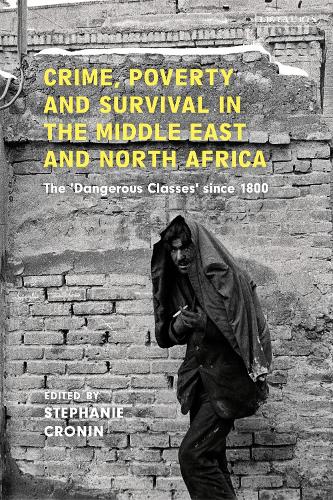
Crime, Poverty and Survival in the Middle East and North Africa: The 'Dangerous Classes' Since 1800
(Paperback)
Available Formats
Publishing Details
Crime, Poverty and Survival in the Middle East and North Africa: The 'Dangerous Classes' Since 1800
By (Author) Stephanie Cronin
Bloomsbury Publishing PLC
I.B. Tauris
29th July 2021
United Kingdom
Classifications
Tertiary Education
Non Fiction
Social and cultural history
Crime and criminology
364.10956
Physical Properties
Paperback
328
Width 156mm, Height 234mm
467g
Description
The concept of the dangerous classes was born in a rapidly urbanizing and industrializing nineteenth century Europe. It described all those who had fallen out of the working classes into the lower depths of the new societies, surviving by their wits or various amoral, disreputable or criminal strategies. This included beggars and vagrants, swindlers, pickpockets and burglars, prostitutes and pimps, ex-soldiers, ex-prisoners, tricksters, drug-dealers, the unemployed or unemployable, indeed every type of the criminal and marginal. This book examines the dangerous classes in the Middle East and North Africa, their lives and the strategies they used to avoid, evade, cheat, placate or, occasionally, resist, the authorities. Chapters cover the narratives of their lives; their relationship with respectable society; their political inclinations and their role in shaping systems and institutions of discipline and control and their representation in literature and in popular culture. The book demonstrates the liminality of the dangerous classes and their capacity for re-invention. It also indicates the sharpening relevance of the concept to a Middle East and North Africa now in the grip of an almost permanent sense of crisis, its younger generations crippled by a pervasive sense of hopelessness, prone to petty crime and vulnerable to induction as foot soldiers into drug and people smuggling, petty gangsterism and jihadism.
Reviews
Accepting the social notion of class and frequently relying on the foundational theories of prominent sociologist Eric Hobsbawm, this collection brings the well-known social history of dangerous classes in Europe to bear on the Middle East and North Africa. Cronin (Univ. of Oxford, UK) has compiled 11 essays from well-recognized scholars of the region that look at societies in Iran, Turkey, Egypt, and Algeria from the bottom up. In already underdeveloped countries with segmented economies that tend to protect those with accumulated social and economic success, the lumpenproletariat (the unproductive) turns to what is available based on street-learned skills and adaptability. For women, this has traditionally meant turning to the oldest known profession, prostitution; for urban youth and rural agricultural workers lacking regular support, the primary alternatives have been gangs and banditry. What comes through in many essays is the general opposition among this class of people, across countries, to the political establishment, regardless of whether it is the tax collector, the landowner, or the national government. This is a well-created sociohistorical collection worthy of addition to Middle East collections. Summing Up: Recommended. Upper-division undergraduates through faculty; professionals. * CHOICE *
Author Bio
Stephanie Cronin is Elah Omidyar Mir-Djalali Research Fellow at St Antonys College and a member of the Faculty of Oriental Studies, University of Oxford. She is the author of seven books, including Armies and State-building in the Modern Middle East: Politics, Nationalism and Military Reform (I. B. Tauris, 2014) and The Army and the Creation of the Pahlavi State in Iran, 1910-1926 (I. B. Tauris, 1997).
